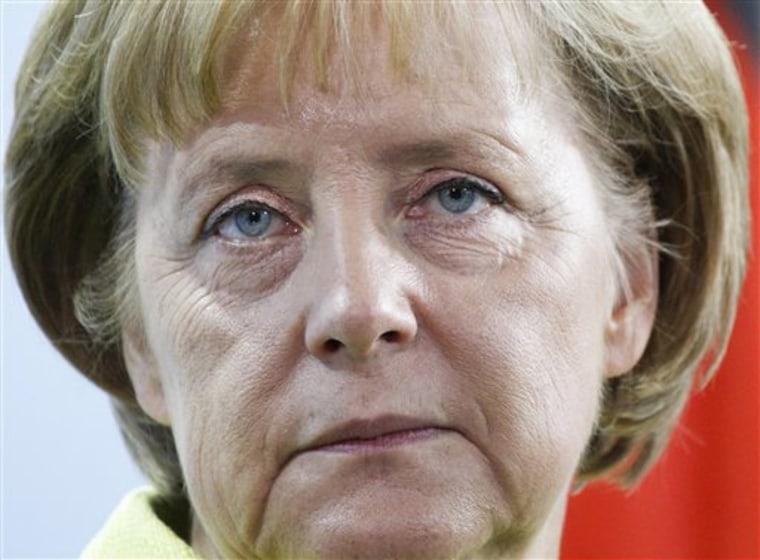New threats by al-Qaida and fierce criticism of a German-ordered airstrike that killed dozens have pushed Germany's mission in Afghanistan to the forefront of this country's national election campaign.
Chancellor Angela Merkel, like her foreign minister and main rival in Sunday's vote, Frank-Walter Steinmeier, has steadfastly backed the deployment even though polls say half the public wants the 4,220 soldiers to come home.
On Monday, Merkel urged calm over the terror threats against Germans if they do not elect candidates who will end the mission, saying "people can be confident that everything is being done for their security."
Top priority for election winner
Despite her reassuring words — and a visible increase in security measures at train stations and airports with police toting automatic weapons — Afghanistan will be the top foreign policy priority for whoever wins the election.
"Afghanistan has slowly grown into a real problem for German politicians," said Eberhard Sandschneider of the German Council on Foreign Relations, noting that some 90 percent of lawmakers support the mission.
"Sooner or later that will lead to a highly problematic situation," he said.
Heading into the election, only the minor Left party campaigned on that issue and both Merkel and Steinmeier were happy to ignore it. That changed Sept. 4 after a German army colonel called in a U.S. airstrike on a pair of hijacked tanker trucks in northern Afghanistan. The bombing appears to have killed dozens of Afghan civilians.
A poll by the Forsa institute, taken Sept. 10-11, shows 55 percent of Germans want their troops brought home. Islamic militants appear bent on changing that.
German voters are far more concerned about the economy than foreign policy. Fully 57 percent of those surveyed in the Forsa poll said parties' positions on Afghanistan played no role whatsoever in deciding their vote; just 3 percent described it as a very important factor. The poll had an error margin of plus or minus 3 percentage points.
A video surfaced Friday featuring an al-Qaida extremist threatening Germans with "a rude awakening after the elections" if they did not push their political parties to pull out the soldiers. The same militant, speaking in German, issued another message two days later, also mentioning Afghanistan.
‘It's creepy and frightening’
Vera Nueckel, 22, a student in Berlin, acknowledged the threats have unnerved her. She said she now avoids the capital's main train station when possible.
"I think it's creepy and frightening," she said Monday. "And I've really gotten worried, because I know what has happened in other countries."
Interior Minister Wolfgang Schaeuble publicly rejected al-Qaida's threats, saying terrorists "will not be able to influence the democratic formation of opinion in Germany."
Schaeuble's words came as an eerie reminder of the 2004 election campaign in Spain, where the government supported a deeply unpopular mission in Iraq.
After Islamic radicals carried out train bombings that claimed the lives of 191 people in Madrid days before elections, voters ousted a conservative government in favor of the socialist opposition — which advocated a pullout.
Within months, Spanish troops were back home.
In the United States, Sen. John Kerry has said that he believes a message from Osama bin Laden cost him his chance at the White House in 2004 just days before the election. In the videotape, bin Laden criticized then-president George W. Bush and warned Americans that "your security is in your own hands" in the election.
Ruled out a coalition with the Left
In Germany, the only party to call openly for an immediate pullout has been the Left, which has urged a withdrawal since its creation before the 2005 election.
Both Merkel and Steinmeier have ruled out a coalition with the Left, a mix of former East German communists and Social Democrats angered by economic reform.
Nevertheless, the mounting pressure for an exit strategy is reflected in the statements from both leading candidates and their parties.
In the wake of the airstrike, Merkel banded with the French and British leaders to call for a new international conference to plot a strategy for Afghanistan, urging that it place more emphasis on training police and soldiers to turn over responsibility more swiftly to the Afghans.
No withdrawal date
Steinmeier, whose Social Democrats have been equally involved in supporting the German mission as Merkel's conservatives, this month suggested that the foundations for an eventual withdrawal should be put in place by 2013 — but offered no withdrawal date.
The Free Democrats, with whom Merkel would like to build a new center-right coalition, agree a withdrawal is necessary in the long term — but that it must not be premature.
For years, German troops have been largely shielded from the worst of suicide or roadside attacks. But with the Taliban gaining influence in the previously peaceful northern regions where the Germans are stationed, that has changed.
"Regardless of who makes up the next government, they will need to spend a lot of energy to better explain the mission in Afghanistan," Sandschneider said.
Participation forbidden, unless defense
One major problem has been how to refer to the mission. Given Germany's history, it is constitutionally forbidden to participate in any war, unless as an act of defense.
Consequently, German ministers have been at pains to avoid calling the Afghan conflict a war, although its troops are increasingly in combat situations and 35 have lost their lives.
"A war takes place between nations," Steinmeier recently told the Bild am Sonntag weekly. "In Afghanistan we are fighting alongside the Afghan government against terrorists, therefore it is not a war but a combat mission."
With the al-Qaida threats fresh in their minds, such distinctions don't appear to resonate with many Germans.
"I have the feeling that the war has finally reached Germany," said Sini Konchar, 33, nodding toward a pair of policemen armed with machine guns that sauntered past him at Berlin's central station.
"And it really makes me angry. I don't think we have any reason to be in Afghanistan."
